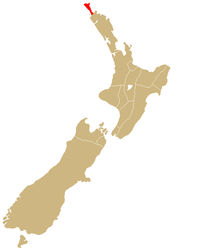Te Pātū
| Te Pātū | |
|---|---|
| Iwi (tribe) in Māoridom | |
 Mangonui Harbour | |
 | |
| Rohe (region) | Northland |
| Waka (canoe) | Kurahaupo |
Te Pātū is a Māori iwi from Northland, New Zealand. The iwi is one of the six Muriwhenua iwi of the far north of the North Island. Te Pātū trace their ancestry back to Tuwhakatere, and their arrival in New Zealand to the Kurahaupo canoe.
According to Te Pātū tradition, Pōhurihanga's descendant Tūwhakatere married two women. His first wife was Tūterangi-a-tōhia; their child was Pōpota, who became an important ancestor of Te Pātū. His second wife as Tūpōia; their son was Hoka.[1]
Te Pātū's Treaty of Waitangi settlement has been signed, but not yet legislated.[2]
Te Reo Irirangi o Te Hiku o Te Ika, an iwi radio station, serves Ngāi Takoto and other Muriwhenua tribes of the Far North. It broadcasts a main station on 97.1 FM, an urban contemporary station Sunshine FM on 104.3 FM and a youth-oriented station Tai FM.[3]
Te Pātū kuia Waireti Walters was a long-serving Māori rights advocate. She campaigned for culturally appropriate cervical screening campaigner and was involved in a Waitangi Tribunal case to recognise Māori rights to flora and fauna. She died in September 2015.[4]
See also[edit]
References[edit]
- ^ Taonui, Rāwiri (24 August 2015). "Muriwhenua tribes". Te Ara: The Encyclopedia of New Zealand. Retrieved 29 May 2018.
- ^ "Te Pāhu". New Zealand Media and Entertainment. New Zealand Herald. Retrieved 4 January 2016.
- ^ "Kaitaia". Welcome to the Radio Vault. New Zealand: The Radio Vault. 23 July 2009. Archived from the original on 9 October 2009. Retrieved 12 June 2015.
- ^ "Staunch Māori rights advocate Waireti Walters dies". Television New Zealand. Te Karere. 25 September 2015. Archived from the original on 29 October 2015. Retrieved 4 January 2016.
